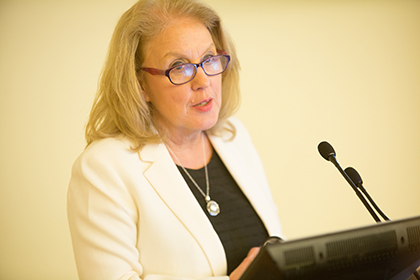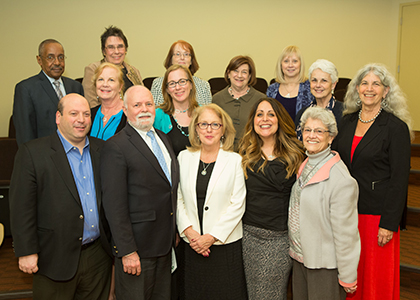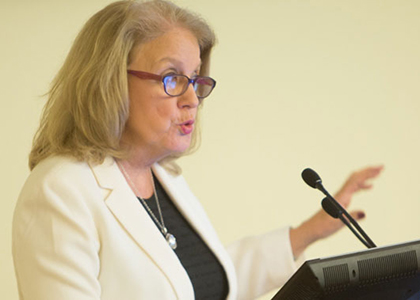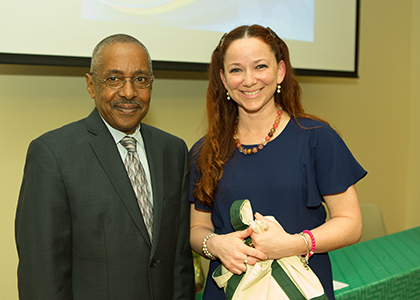Education reform over the last 30 years has reshaped the goals and expectations around teacher preparation, including heavy reliance on standardized testing, the growing scrutiny of teachers, and the push toward privatizing public schools, said longtime teacher-education scholar Dr. Marilyn Cochran-Smith on Thursday night.

Politicians, advocacy organizations, philanthropists, venture capitalists
and entrepreneurs have driven education reform, said Marilyn
Cochran-Smith. Meanwhile, educators themselves aren’t typically
welcomed to the table to craft education policy and agenda.
Cochran-Smith, the Cawthorne Professor of Teacher Education for Urban Schools at Boston College, delivered the 21st annual June Fox Lecture to a packed University Hall Amphitheater on April 13.
“We know that teachers matter to the general quality of our education system,” said Cochran-Smith, “which, in turn, matters to the economic health of the nation and the wellbeing of its people.”
However, too many in the United States fail to acknowledge the effect of out-of-school factors, such as poverty, family and community resources, housing, healthcare and early childhood services.
“These have a much larger impact overall on school outcomes,” she noted. “The problems we face in teacher education will never be solved by focusing on teacher quality alone.”
She took the audience on a quick journey through President George W. Bush’s No Child Left Behind education reform act and its subsequent iterations in the past 15 years, and concluded that she is not hopeful for more enlightened education policies under the administration of President Donald Trump and Secretary of Education Betsy DeVos.
“I am not optimistic that a complex understanding of these tensions which undergird education policies informs the Trump administration,” she said. “To the contrary, his inclination so far is a simplistic and decidedly un-nuanced take.”
She predicts that the situation in education will be eroded further by proposed cuts to services like summer programs and federal work study, to make way for expanded school vouchers.
“This approach treats education as a commodity,” she said. “In contrast, democratic education has to do with the common good, and it’s essential to the future of our democratic society now more than ever. It’s essential for the public good.”
A tough time to teach teachers
Amid the growing reliance on student test scores and quantitative measures of “highly qualified” teachers, traditional education schools have come under attack, according to Cochran-Smith, who is also director of the Ph.D. Program in Curriculum and Instruction at the Boston College’s Lynch School of Education.

“The problems we face in teacher education will never be solved by
focusing on teacher quality alone,” said Dr. Cochran-Smith, pictured
with members of the June Fox Lecture Series Committee.
“Teacher education has felt the brunt of excoriating criticism for many years, often without evidence and often from those with much greater power and resources,” she said.
Politicians, advocacy organizations, philanthropists, venture capitalists and entrepreneurs have driven education reform, while third-party accrediting organizations have cropped up with dubious methods of assessing teachers’ colleges, she said. Meanwhile, educators themselves aren’t typically welcomed to the table to craft education policy and agenda.
Cochran-Smith has observed that this pressure for teachers to be judged on student performance is a disincentive for teacher candidates to serve in poorer and lower-performing districts. This increases educational inequality and decreases educational opportunity for economically disadvantaged and minority students.
In the face of a persistent narrative around America’s failing schools and bad teachers, alternative pathways to teacher education have emerged in almost every state, including many programs that operate outside of colleges and universities, such as for-profit schools with solely online coursework.
Meanwhile, other countries are moving toward more professional teacher education. For instance, Norway will now require a master’s degree for all entry-level teachers, which Finland has already adopted, and Ireland and New Zealand have moved from three-year undergraduate teaching programs to four-year programs.
“We do have to be aware that our situation is pretty unusual,” said Cochran-Smith. “In most places, if they’re worried about performance, they want more university.”
We have the capacity to work together for change
For all the flaws and blind spots of the prevalent criticism of teachers and teacher education, increased scrutiny also has its place, she acknowledged.

“We have a lot of work to do in teacher education. … But we also have,
I think, a lot to work with. And I believe we have the capacity to work
together for change even in these uncertain times,” said Cochran-
Smith.
“Those of us who are involved in the day-to-day work of teacher education need to ask really hard questions about our own programs and open ourselves to genuine interrogation about what we are doing well, how well, and to what end,” said Cochran-Smith. “Part of this is considering why it is that so many external reformers think of universities of teacher education as a failed project and whether or not it is true. And there is some evidence that it’s at least partly true.”
Teacher educators must approach innovation with open-mindedness and curiosity, work to make sure that teacher candidates are steeped not only in theory but in classroom practice, and give graduates the tools to create successful learning environments.
In this context, preparing teachers who think critically and can teach students from a wide variety of backgrounds is more important than ever. She praised Lesley as a model in this regard.
“When innovation comes along, why is our first reaction to circle the wagons in self-defense rather than understand the goals and purposes of the new approaches and whether we might learn from them?” she posed. “This is not easy to do.
“We have a lot of work to do in teacher education and in education more broadly,” she said. “But we also have, I think, a lot to work with. And I believe we have the capacity to work together for change even in these uncertain times.”
Scholarships honor the legacy of June Fox
Laura Schall-Leckrone and Elizabeth Stringer-Keefe, Lesley education professors and co-chairs of the June Fox Lecture Series Committee, welcomed the audience, followed by remarks from Dean Jack Gillette and President Jeff Weiss.

M.Ed. candidates Camille Garcia (pictured, with Retired Dean William
Dandridge), Danielle Nathanson and Katharine Needham received
scholarship awards at the ceremony.
Each speaker honored former Lesley Dean June Fox, whose legacy endures as a mentor for her colleagues and a dedicated advocate for her students, and who embodied our ongoing commitment to excellence, equity and creativity in education.
The lecture kicked off with the presentation of three scholarship awards to Lesley students:
- Dean Jack Gillette presented the June T. Fox Scholarship to Danielle Nathanson, an M.Ed. candidate in Moderate Disabilities, enrolled in the Collaborative Program in Brookline Public Schools.
- Retired Dean William Dandridge presented the William Dandridge Book Award to Camille Garcia, an M.Ed. candidate in Elementary and ESL, enrolled in a practicum at Hugh Roe O’Donnell Elementary School in East Boston.
- Associate Professor Valerie Harlow Shinas presented the Mario Borunda Book Award to Katharine Needham, anM.Ed. candidate in Elementary and Specialist Teacher of Reading, enrolled in a practicum at Kipp Academy in Mattapan.
The lecture was followed by a lively reception in the Parker Gallery in the University Hall Atrium.